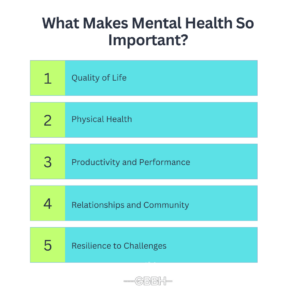In today’s fast-paced world, maintaining good mental health is more important than ever. Mental wellbeing encompasses our emotional, psychological, and social health, influencing how we think, feel, and act. As we navigate daily challenges, it’s essential to prioritize our mental health just as we do our physical health. This blog explores 8 practical ways to enhance your mental health, emphasizing the importance of self-care, healthy relationships, and professional support. Whether you’re seeking to improve your resilience, manage stress, or foster personal growth, these actionable strategies will guide you toward a healthier and more fulfilling life. By incorporating these practices into your daily routine, you can build a strong foundation for your mental wellbeing and create a more balanced lifestyle.
What is Mental Wellbeing?
Mental wellbeing refers to a state of mental health in which individuals feel balanced, fulfilled, and able to cope with the stresses of daily life. It encompasses emotional, psychological, and social dimensions and is characterized by:
- Emotional Resilience: The ability to bounce back from setbacks and adapt to change. Individuals with good mental wellbeing can manage their emotions effectively and maintain a positive outlook, even in challenging situations.
- Self-Acceptance: A sense of contentment and acceptance of oneself, including recognizing personal strengths and weaknesses. People with high mental wellbeing often have a positive self-image and a healthy relationship with themselves.
- Life Satisfaction: A feeling of fulfillment and happiness in life. This includes satisfaction with various life domains, such as work, relationships, and personal goals.
- Healthy Relationships: The ability to build and maintain meaningful relationships with others. Good mental wellbeing involves effective communication, empathy, and a sense of belonging within social circles.
- Coping Skills: The capacity to manage stress and navigate life’s challenges. Individuals with strong mental wellbeing employ various coping strategies to handle difficult situations constructively.
Mental wellbeing is crucial for overall health, influencing how we think, feel, and act. It impacts our relationships, decision-making, and resilience against mental health challenges.
What Makes Mental Health So Important?
Mental health is fundamental for several reasons, influencing not just the individual but also the community and society as a whole:
- Quality of Life: Good mental health significantly enhances quality of life. It allows individuals to pursue their interests, engage in activities they enjoy, and maintain healthy relationships. When mental health is prioritized, individuals are more likely to experience joy, fulfillment, and satisfaction in their lives.
- Physical Health: There is a profound connection between mental and physical health. Poor mental health can lead to physical issues such as heart disease, diabetes, and weakened immune function. Conversely, maintaining good mental health can improve physical well-being and lead to healthier lifestyle choices.
- Productivity and Performance: Mental health directly affects productivity and performance in various areas of life, including work and academic settings. Individuals with good mental health are often more focused, motivated, and creative, leading to improved outcomes in their professional and personal lives.
- Relationships and Community: Mental health influences how we interact with others. Positive mental health fosters healthy relationships, social cohesion, and community engagement. When individuals are mentally healthy, they contribute positively to their families, workplaces, and communities, creating a supportive environment for all.
- Resilience to Challenges: Mental health equips individuals with the tools to cope with adversity. Those who prioritize their mental well-being are more resilient and better prepared to handle life’s challenges, reducing the risk of mental health disorders.
Mental health matters the most when it comes to your well-being. Just like we take care of our physical health, it’s crucial to focus on our mental health too. Here are eight practical ways to enhance your mental health, allowing you to live a happier and more fulfilling life.
1. Practice Mindfulness
Mindfulness can help reduce stress and anxiety. You can do this via deep breathing, meditation or just by paying close attention to the things around you. Start with just a few minutes a day, focusing on your breath or the sensations around you. Over time, this practice can lead to improved mental clarity and emotional stability.
2. Stay Active
Aim for at least 30 minutes of moderate exercise, like walking, jogging, or dancing, several times a week. Regular activity can boost your self-esteem, release endorphins and reduce symptoms of anxiety and depression.
3. Build Strong Connections
Surround yourself with family, friends, or supportive colleagues who understand you. Make time for social activities, whether it’s having coffee with a friend or joining a local group. These connections can provide comfort and reassurance during difficult moments and tough times.
4. Seek Professional Help
If you’re struggling with your mental health, consider reaching out to a professional. Many people benefit from Mental Health Therapy Programs that can provide the support they need. Therapists can guide you through different treatment options, such as Cognitive-behavioral therapy (CBT) or Dialectical behavior therapy (DBT). These therapies help manage your thoughts and emotions more effectively.
5. Set Realistic Goals
Set goals that are not too difficult to achieve at the first go. You can also break down big goals into smaller goals. Whether it’s a personal project or a work-related objective, having something to work toward can boost your confidence and mental well-being.
6. Practice Self-Compassion
Be kind to yourself. It’s important to recognize that everyone has struggles, and it’s okay to seek help. Self-compassion means that you treat people with kindness and empathy. If you make a mistake or face a setback, avoid harsh self-criticism. Instead, remind yourself that it’s a part of being human.
7. Explore Group Therapy
Group therapy is much needed in order to improve overall mental health. In a Group Therapy Program, you can share your experiences with others who understand what you’re going through. This setting provides a sense of community and can help you feel less isolated. Plus, learning from others can offer new perspectives on your own challenges.
8. Engage in Activities You Love
Find hobbies or activities that you enjoy, whether it’s gardening, painting or even playing instruments, engaging in activities that make you happy can serve as a great stress reliever and improve your mood. Try to include these in your routine as much as you can.
Recognizing When to Make Changes
Recognizing when to make changes for improved mental health is crucial for maintaining overall well-being. Here are some indicators that it may be time to seek support or make lifestyle adjustments:
- Persistent Symptoms: If you experience prolonged feelings of sadness, anxiety, irritability, or hopelessness that interfere with your daily life, it may be time to seek help. These symptoms can signal underlying mental health issues that need addressing.
- Changes in Behavior: Noticing changes in your behavior, such as withdrawing from social activities, losing interest in hobbies, or exhibiting increased anger or frustration, can be signs that something is amiss. These changes can affect relationships and overall quality of life.
- Difficulty Managing Stress: If you find it increasingly challenging to cope with everyday stressors, it may be time to evaluate your mental health. Chronic stress can lead to burnout and exacerbate existing mental health conditions.
- Physical Symptoms: Mental health can manifest through physical symptoms such as fatigue, headaches, changes in appetite, or sleep disturbances. If you experience unexplained physical symptoms alongside emotional distress, it may be an indication to assess your mental well-being.
- Seeking Support: If you find yourself frequently seeking support from friends or family for emotional issues, it may be a sign that professional help could benefit you. A mental health professional can provide the tools and strategies necessary to navigate challenges effectively.
- Life Changes: Major life events, such as loss, trauma, or significant changes in your personal or professional life, can trigger mental health challenges. If you notice a decline in your mental wellbeing after such events, it’s important to seek support.
Conclusion
Enhancing your mental health is a journey that involves various strategies and practices. Whether it’s through mindfulness, physical activity, or seeking professional help, every small step can contribute to a healthier mind. For those in need of additional support, consider programs at a Mental Health Treatment Center in Massachusetts. They offer specialized therapies, including Acceptance and Commitment Therapy and Trauma Therapy Program, to help you on your journey to better mental health.
If you live in an area like Greater Boston, the Greater Boston Behavioral Health Center is what you need. They provide a range of mental health services designed to meet individual needs, helping you to navigate through difficult times. Remember that paying attention to your mental health matters as much as your physical health does. Call us at (888)278-0716 today to learn more about our services and how we can help you on your journey to recovery!
FAQ on Tips to Boost Your Mental Health
What are some simple ways to improve mental health?
Some simple ways to enhance mental health include practicing mindfulness, engaging in regular physical activity, maintaining a balanced diet, and nurturing social connections.
How can therapy help with mental health?
Therapy, including cognitive-behavioral therapy and dialectical behavior therapy, provides individuals with tools to manage emotions, cope with stress, and gain insights into their thoughts and behaviors.
What role does physical health play in mental wellbeing?
Physical health and mental wellbeing are interconnected. Regular exercise, a balanced diet, and adequate sleep can significantly improve mood and reduce anxiety and depression symptoms.
When should I consider seeking professional help for my mental health?
If you experience persistent feelings of sadness, anxiety, or stress that interfere with daily life, or if you notice significant changes in behavior, it may be time to seek professional support.
Are there specific mental health programs available for support?
Yes, mental health treatment centers, Greater Boston Mental Health Treatment Center in Massachusetts, offer various programs, such as intensive outpatient programs and partial hospitalization programs, to support individuals in need.


